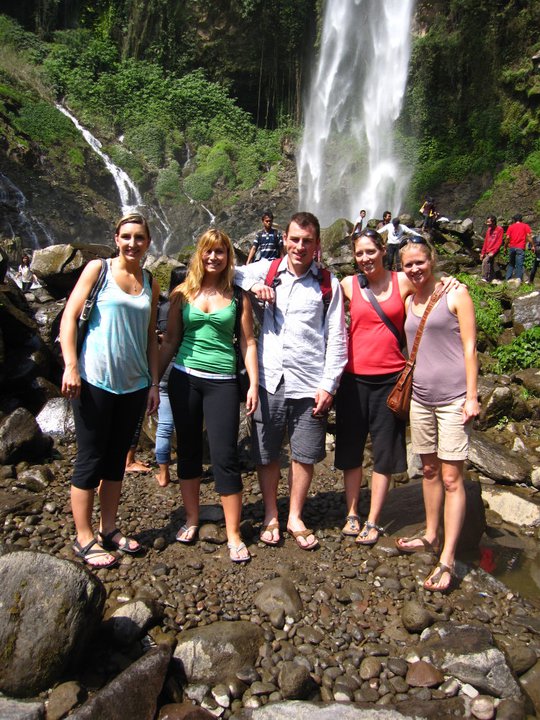
In sticky, 35 degree heat, Camille Dubé raced across the bumpy Indonesian countryside on the back of a motorbike. She sprawled in the tropical white sands of Bali. She lost her appetite after unearthing a chicken heart in her plate of rice.
But Dubé was not on a holiday. An occupational therapy student at the University of Alberta Faculty of Rehabilitation Medicine, Dubé travelled with four classmates to Solo, Indonesia to complete her final clinical placement abroad this summer.
"Travelling to Indonesia was a fantastic opportunity to apply what I learned in school, and it also helped me identify what I'm weaker at and what areas I need to work on," she smiles.
Through Surakarta Health Polytechnic, Dubé was paired with three different sites over her six week placement: a mental health hospital, a paediatrics facility, and community homecare visits.
"I really had to think critically and problem solve constantly because I was plopped in the middle of things with limited resources," she says. "I would make a commode by sawing a hole in a lawn chair and I'd fill water bottles with rocks or sand to make weights."
This lesson on being resourceful is one among many reason Shaniff Esmail, PhD, associate chair of the University of Alberta's occupational therapy program, supports clinical placements abroad in Indonesia.
"Our students are able to challenge themselves in this international setting," he says. "Their master's level education is valued as a great resource in Indonesia, and the facilities and hospitals expect them to teach and learn."
Last year, four U of A OT students went to Indonesia to do a placement and it was very successful, so this year five students went says Esmail. But the University of Alberta's connection with Indonesia extents back much farther than two years.
"U of A professor Sharon Brintnell is considered the mother of occupational therapy in Indonesia. She and her team helped get it going back in the late 80s and we have been supporting OT in Indonesia ever since," smiles Esmail.
Funded by a grant to initiate OT in Indonesia, four Indonesia physiotherapists travelled to Canada and studied occupational therapy here at the U of A. The four alumni then returned to Indonesia to start an occupational therapy program, and Surakarta Health Polytechnic is now the only OT program in Indonesia recognized by the World Federation of Occupational Therapists. Today it is still ran by three of the four U of A alumni, and Esmail spent three months revamping their curriculum in 2005.
"We're making a difference - not just here, but internationally," says Esmail. "And if you really look at it, without the University of Alberta, would occupational therapy be alive and well in Indonesia? Who knows?"
Jarett Stastny also completed his final clinical placement at Surakarta Health Polytechnic, and is grateful for the Indonesian connection that provided him with such a unique learning experience.
"There is a longstanding relationship between our institutions, so they've already taken students from the U of A before," he says. "The familiarity with the process made things very convenient and easy for us to get involved. It's a great opportunity to mix personal development with professional development - there's a depth of learning that you just don't get when you're comfortably surrounded by what you know."
Esmail says the Department of Occupational Therapy intends to keep this connection alive and strong, and plans are in the works to initiate world federation approved programs in Jakarta, Indonesia and Denpasar, Bali.
About the University of Alberta Faculty of Rehabilitation Medicine
As the only free standing faculty of rehabilitation in Canada, the University of Alberta Faculty of Rehabilitation Medicine balances its activities among learning, discovery and citizenship (including clinical practice). A research leader in musculoskeletal health, spinal cord injuries and common spinal disorders (back pain), the Faculty of Rehabilitation Medicine aims to improve the quality of life of citizens in our community. The three departments, Occupational Therapy (OT), Physical Therapy (PT) and Speech Pathology and Audiology (SPA) offer professional entry programs. The Faculty offers thesis-based MSc and PhD programs in Rehabilitation Science, attracting students from a variety of disciplines including OT, PT, SLP, psychology, physical education, medicine and engineering.